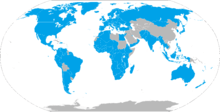International Trade Union Confederation
The International Trade Union Confederation (ITUC; French: Confédération syndicale internationale (CSI); German: Internationaler Gewerkschaftsbund (IGB); Spanish: Confederación Sindical Internacional (CSI)) is the world's largest trade union federation. It was formed on 1 November 2006, out of the merger of the International Confederation of Free Trade Unions (ICFTU) and the World Confederation of Labour (WCL). The Founding Congress of the ITUC was held in Vienna and was preceded by the dissolution congresses of both the ICFTU and the WCL. The ITUC has three main regional organizations – the Asia-Pacific Regional Organization, the American Regional Organization, and the African Regional Organization.[1] The Trade Union Development Cooperation Network (TUDCN) is an initiative of the ITUC whose main objective is to bring the trade union perspective into international development policy debates and improve the coordination and effectiveness of trade union development cooperation activities.[2]
.svg.png) | |
| Founded | 1 November 2006 |
|---|---|
| Predecessor | ICFTU and WCL |
| Members | 207 million in 163 countries (2018) |
| Key people |
|
| Office location | Brussels, Belgium |
| Country | International |
| Website | ituc-csi.org |
| Part of a series on |
| Organised labour |
|---|
 |
|
Labour movement
|
|
Academic disciplines |
The ITUC represents 207 million workers through its 331 affiliated organizations within 163 countries and territories.[3] Sharan Burrow is the current General Secretary.[4]
The ITUC traces its origins back to the First International (also known as the International Workingmen's Association) and in 2014 commemorated the 150th anniversary of the founding of the International Working Men's Association at its own world congress held in Berlin. Also in 2014, the ITUC debuted the Global Rights Index, which ranks nations on 97 metrics pertaining to workers' rights, such as freedom from violent conditions and the right to strike and unionise.[5] According to the 2020 update of the Index, there has been a significant increase in violations of workers' rights around the world.[6]
Inaugural congress 2006
The founding congress of the ITUC was held from 1 to 3 November 2006 in Vienna, Austria.
The first day of the congress saw the formal creation of the ITUC followed by an address by Juan Somavia, the Director-General of the International Labour Organization (ILO).[7]
Day two included Pascal Lamy, the Director-General of the World Trade Organization (WTO) responding to panel discussions on the impact of globalisation, including the topics "Cohesion and chaos - the global institutions" and "Global unions - global companies". Technical difficulties limited Lamy's satellite video link participation.
Leadership and officers were elected on the final day of the congress. Guy Ryder, the former general secretary of the ICFTU, was elected to the same position in the new organisation.[8] Sharan Burrow was elected president. A Governing Council was established, with 70 elected members, and 8 additional seats reserved for youth and women’s representatives.
A Council of Global Unions was also formed on the final day of the congress. It was established jointly with ten global union federations and the Trade Union Advisory Committee to the OECD (TUAC).
The Council will enable us to mobilize global membership around political and strategic initiatives and actions in order to confront global forces that work against the interests of working people and families.
— Guy Ryder[9]
Second congress 2010
The second congress of the ITUC was held from 21 to 25 June 2010 in Vancouver, Canada.
On 25 June 2010, at the conclusion of the congress, Sharan Burrow (then ITUC President) was elected General Secretary, succeeding Guy Ryder (who had been elected as Deputy Director General of the International Labour Organization).[10] In anticipation of her election, Burrow had resigned from her position as President of the Australian Council of Trade Unions effective 1 July 2010.[11]
Speaking to the Congress after her election, Burrow paid tribute to her predecessor and emphasised the continuing role of organised labour in the world's emergence from the Global Financial Crisis. She also made special mention of the significance of her election as the first female leader of the world's largest trade union (against a background of high workforce participation by women and a Congress 50% of whose delegates were women[12]):
I am a warrior for woman and we still have work to ensure the inclusion of women in the work place and in our unions. The struggles for women are multiple – too often within their families for independence, then in the workplace for rights and equal opportunity, in their unions for access and representation and then as union leaders. But the investment in and participation of women is not only a moral mandate it is an investment in democracy and a bulwark against fundamentalism and oppression. Organising woman is and must continue to be a priority for the ITUC.[13]
Organisation

The Pan-European Regional Council (PERC), a European trade union organisation within the ITUC was formed 19 March 2007. It consists of 87 national trade union centres and a total membership of 87 million. It works closely with the European Trade Union Confederation (ETUC). The ITUC raises capital through charging dues to its member organisations.[14]
Leadership
General Secretaries
- 2006: Guy Ryder
- 2010: Sharan Burrow
Presidents
- 2006: Sharan Burrow
- 2010: Michael Sommer
- 2014: João Antonio Felicio
- 2018: Ayuba Wabba
See also
References
- "About Us". International Trade Union Conferation. Retrieved 15 November 2017.
- "Development (TUDCN)". International Trade Union Confederation. ITUC-CSI-IGB. Retrieved 15 November 2017.
- "International Trade Union Confederation". www.ituc-csi.org. Retrieved 28 September 2018.
- "About us". ITUC. Retrieved 4 July 2010.
- Kevin Short (28 May 2014). The Worst Places On The Planet To Be A Worker. The Huffington Post. Retrieved 29 May 2014; see also: ITUC Global Rights Index: The world's worst countries for workers.
- Srikanth, Anagha (18 June 2020). "The US ranks worse than these major economies for "systematic violation of workers' rights, according to a new report". The Hill. Retrieved 19 June 2020.
- "ILO Director-General lauds formation of new global union federation". ILO Online press room. Retrieved 3 November 2006.
- "Archived copy". Archived from the original on 3 February 2015. Retrieved 31 January 2015.CS1 maint: archived copy as title (link)
- "Council of Global Unions formed [...]". ITUC Online. Retrieved 3 November 2006.
- "Sharan Burrow Acceptance Speech". ITUC Online. Retrieved 4 July 2010.
- "Executive - Australian Council of Trade Unions". ACTU Online. Archived from the original on 29 June 2010. Retrieved 4 July 2010.
- "Second ITUC World Congress concludes by electing its first female General Secretary". ITUC Online. Retrieved 4 July 2010.
- "Sharan Burrow Acceptance Speech". ITUC Online. Retrieved 4 July 2010.
- Rehli, Florian (2010). "International Trade Union Confederation". International Encyclopedia of Civil Society. SpringerLink. pp. 894–895. doi:10.1007/978-0-387-93996-4_409. ISBN 978-0-387-93994-0.
Bibliography
- Fabio Bertini (2011), Gilliatt e la piovra. Il sindacalismo internazionale dalle origini ad oggi (1776-2006), Roma, Aracne
- Ed Mustill (2013), The Global Labour Movement: An Introduction, a short guide to the global union federations, the ITUC, and other international bodies
External links
| Wikimedia Commons has media related to CSI Member. |
- Official website

- "Workers of the world unite in Vienna". WikiLeaks. 9 November 2006. WikiLeaks cable: 06VIENNA3297. Retrieved 8 July 2015. Cite journal requires
|journal=(help) - ITUC Global Rights Index 2020
